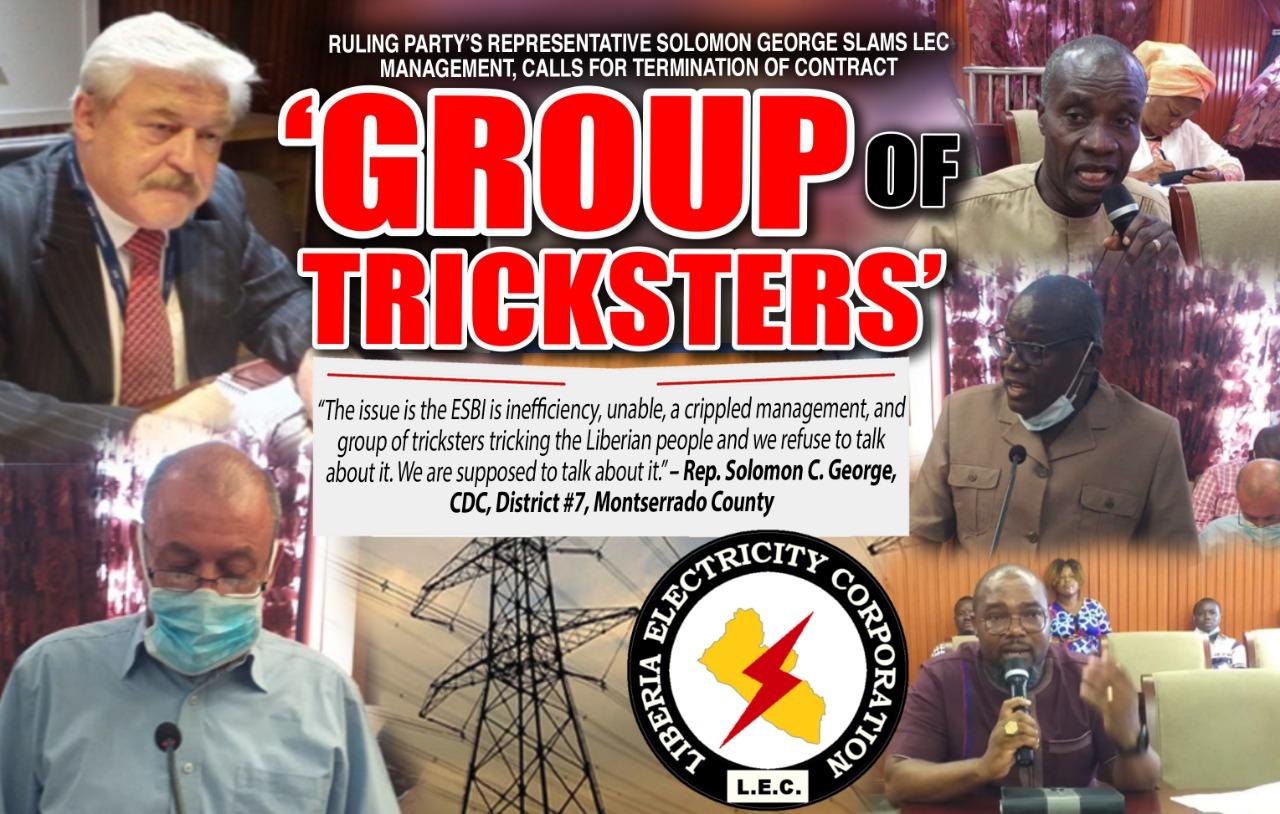
Africa-Press – Liberia. The Liberia Electricity Corporation’s inability to supply its many customers electricity is not only annoying private citizens and customers, VIPs including members of the 54th Legislature are venting their anger not only at LEC management, but other key players of the energy sector including the Liberia Electricity Regulatory Authority (LERC) and the Ministry of Mines and Energy.
Members of the House of Representative did not hide their feelings when senior officials and management of these key institutions appeared before the full Plenary to explain reasons behind the unprecedented power outage in Monrovia for months.
No lawmaker was more damning than the tough talking Rep. Solomon George (CDC, District #7, Montserrado County). Speaking on the House’s floor, Rep George slammed the LEC management over its inability to supply power efficiently, and urged the Legislature to call for the review of the current contractual agreement signed with the Government of Liberia.
“The issue is the ESBI is inefficient, unable, a cripple management, and group of tricksters tricking the Liberian people and we refuse to talk about it. We are supposed to talk about it,” said Rep. George.
According to Rep. George, the current agreement between the LEC and the government is valued at over US$10 million; and as such, it should been forwarded to the Legislature for ratification. His outburst against the LEC was in response to the LEC’s acting Manager, Jacques Philip’s explanation about the reasons behind the power outage.
According to Mr. Jacques Philip, who is also the Chief Financial Officer (CFO) of LEC, the continued power outage is the result of the early arrival of the dry season that has dropped the water level at the Mount Coffee hydroelectric power plant.
Philip said the increase in fuel price has also left the LEC vulnerable and unable to purchase needed fuel. In addition, he said Ivory Coast’s was demanding that Liberia pays the money owed for supplying power to rural counties since 2014; something he said the LEC was not able to do. In addition, he said the unit price charged by Ivory Coast was too high and not viable.
He said: “Payment for power supplied by Ivory Coast through the CLSG that has been received across the border since 2014, the debt, and that is significant amount of money that LEC doesn’t have, and also requires a security deposit for three month supply, and that is a significant amount that the LEC doesn’t have. The unit price that they want to charge Liberia is significantly higher than it is viable. “
The LERC, through its officials, noted that the problem can only be solved when “We increase our generation and this can be done when we are connected to the CLSG.”
The LERC, as the regulatory arm of Liberia’s electricity sector, last month threatened to take unspecified actions against the LEC for its power shedding exercise which has deprived many communities of power for weeks, and some for months.
The LEC had earlier announced in a memo that it was unable to provide normal services during the dry season as it would during the rainy season due to the shortage of water supply at the Mount Coffee hydro in White Plains. To mitigate the situation, the LEC introduce the load shedding measure.
Load shedding is used to relieve stress on a primary energy source when demand for electricity is greater than the primary power source can supply. It is a way to help reduce power demand by turning power off to some customers to help prevent longer, larger outages.
But as it stands in Liberia, the LEC load shedding exercise launched by its current management, the Irish based ESBI Engineering & Facility Management Limited has left many consumer waiting for power for days; most times in vain.
The situation led the LERC to issue a statement describing the LEC’s massive load shedding in its operational areas as unacceptable, and called on the management to set into motion remedies to address the electricity generation nightmare. But nearly a month after the warning by the LERC, there have been no improvement; in fact it continues to get worse.
Meanwhile, the Ministry of Mines and Energy, called for the LEC to be divided into two separate institutions created by law, and they include the Liberian Electricity Generation and Transmission Authority and the Liberia Electricity Distribution Authority. He said when this is done, it will help reduce the huge burden of LEC and promote the separation of power.
But the lawmakers did not give in to the officials’ excuses. Rep. Thomas Goshua of Grand Bassa County, who authored the communication that led to the appearance of the officials called for LEC to be privatized. He accused the current management of undermining the government’s Pro Poor Agenda for Prosperity and Development (PAPD).
Rep. Dorwohn Gleekai (District 6, Nimba County) backed his colleague and called for the government to outsource the LEC. Following a sustained deliberation, Plenary mandated the stakeholders to work with its relevant committee to and draw up comprehensive plan and strategies to address the situation.
For More News And Analysis About Liberia Follow Africa-Press





